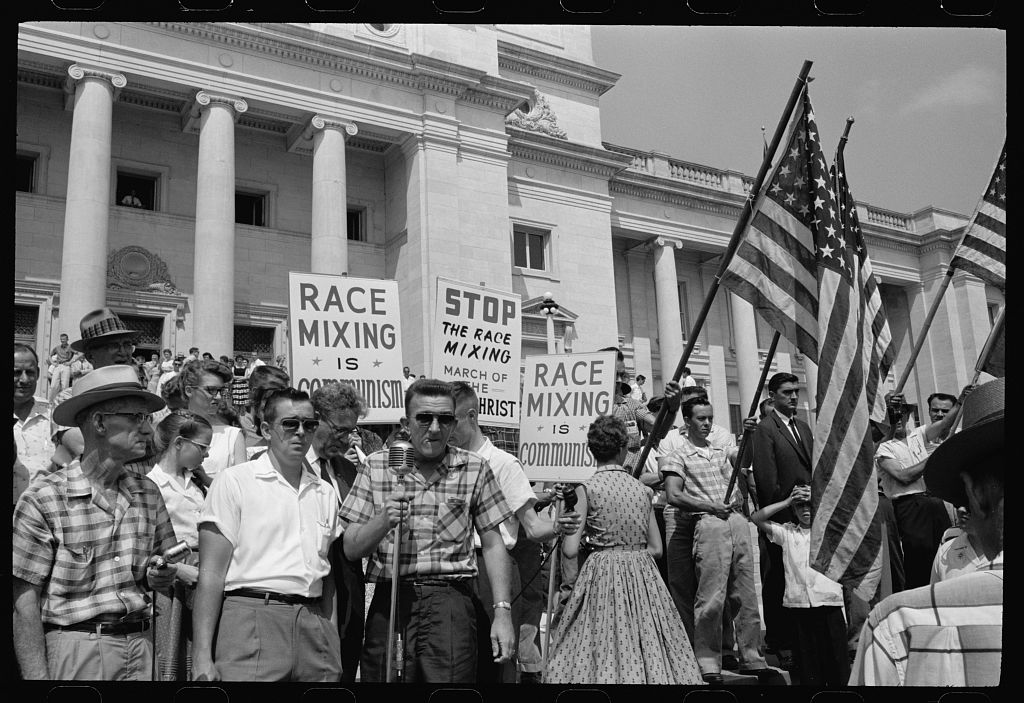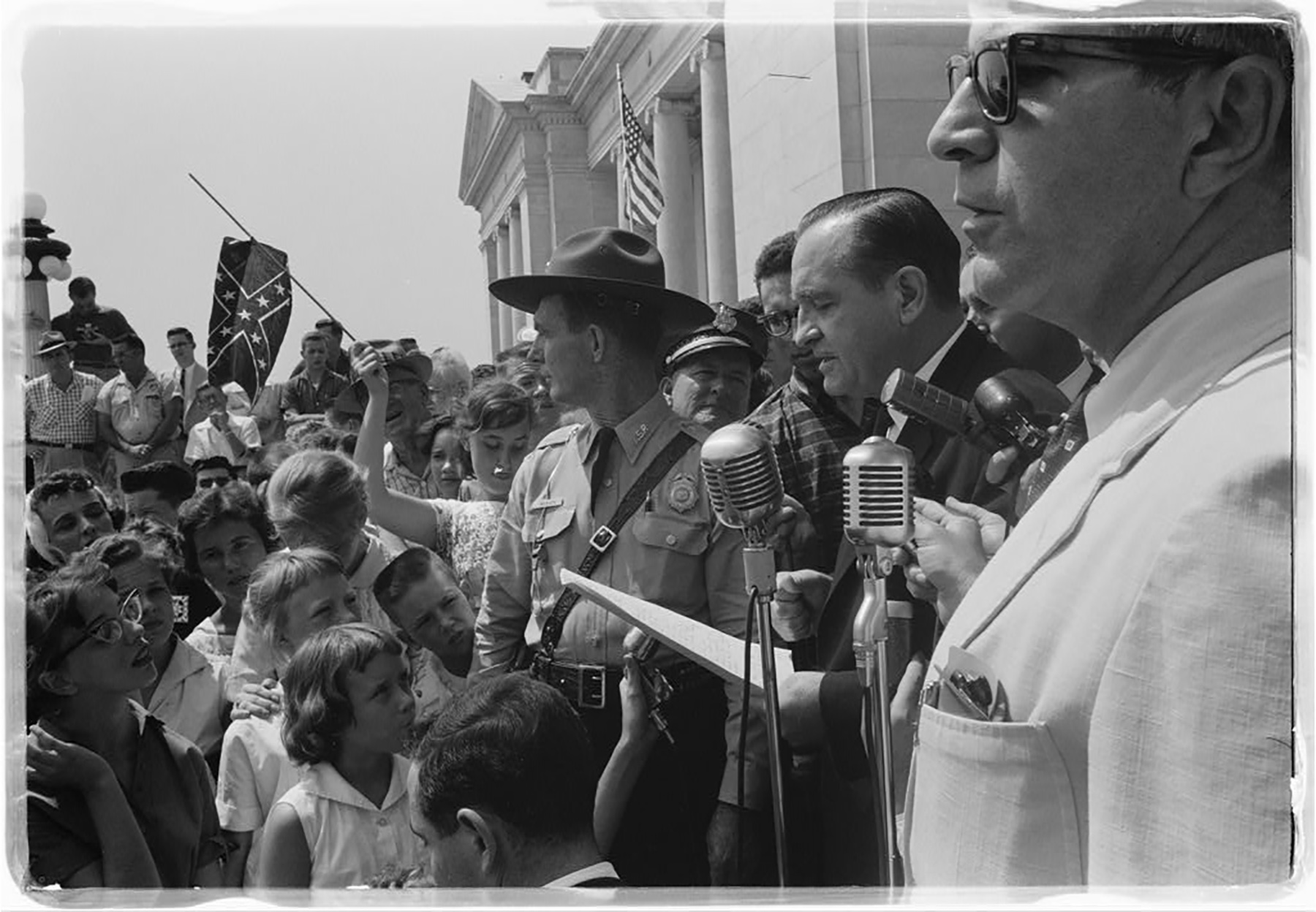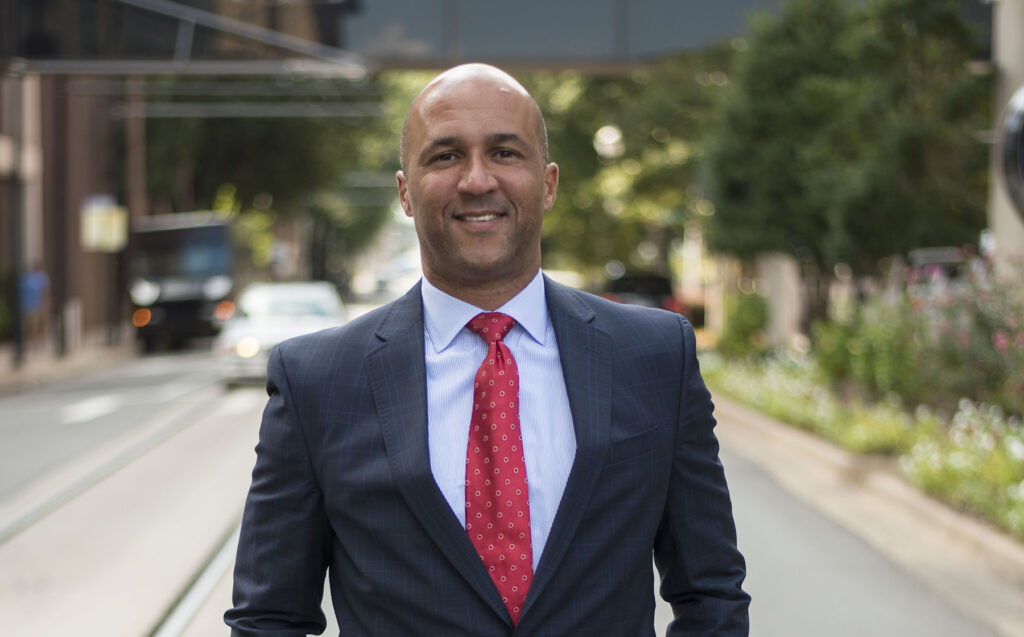In 1957, Little Rock Central High School in Arkansas made headlines for the contentious integration of the Little Rock Nine following the 1954 Supreme Court decision in Brown v. Board of Education. In 2024, Central High School is, once again, at the center of a civil rights dispute.
In April, two Central High School teachers, two students and their parents, and the state’s NAACP chapter filed a lawsuit challenging a section of the recently enacted LEARNS Act, an education bill signed by Republican Gov. Sarah Huckabee Sanders last year. The lawsuit challenges a provision of the law which effectively removes credit from the Advanced Placement (AP) African American Studies course and bars, among other things, teachings “that would indoctrinate students with ideologies” like Critical Race Theory (CRT).
CRT is a field of study which focuses on systemic racism in America’s history and how laws and institutions have enhanced the power struggle between white and Black people. But its critics claim that the focus on white supremacy and the history of racism creates a harmful narrative that makes white students feel guilty. The bill follows a pattern of other measures from Republican lawmakers in state legislatures seeking to restrict how race is taught in the classroom.
In a statement to the Associated Press in August, the College Board, a not-for-profit organization which creates the AP program, said the course “is not indoctrination, plain and simple.”
“AP teachers are experienced and highly skilled professionals,” the statement read. “We are fully confident in their abilities to teach this course in complete compliance without any indoctrination.”
The lawsuit alleges that the challenged “indoctrination” provision “absolutely chills free speech” and “discriminates on the basis of race.” But Jeff LeMaster, communications director for the office of Arkansas Attorney General Tim Griffin, told First Amendment Watch they “will continue to vigorously defend the LEARNS Act.”
First Amendment Watch spoke with civil rights attorney Mike Laux, who is representing the plaintiffs. Laux described the parallels between the historical Little Rock Nine and the state’s recent actions to allegedly diminish the AP African American Studies course, the content and viewpoint-based restrictions he says are embedded in the bill, and the importance of an inclusive education.
Editor’s note: This interview has been edited and condensed for length and clarity.
FAW: What is the main focus of the complaint?
ML: On Friday, April 12, we filed the first amended complaint in the LEARNS Act case. The first amended complaint consists of four counts of primarily First and 14th Amendment constitutional violations. We’re alleging that the LEARNS Act, at least one particular part of Section 16, which is called “indoctrination,” is unconstitutional in any number of ways. Regarding the First Amendment, it is unconstitutional insofar as it’s overly vague. It’s almost indecipherably vague. It doesn’t define core terms. And that’s essential because when you have a law or statute that has to be followed, you have to give proper notice as to the behavior or conduct that’s prohibited. That’s due process. And so in the case here, this statute is written in a way that it does not alert a reasonable teacher or a reasonable speaker to the boundaries of what is considered to be acceptable or not under the statute. It outlaws CRT [Critical Race Theory] in the classroom, but doesn’t define CRT. It doesn’t define indoctrination. It doesn’t define what constitutes a lecturer or a guest speaker. A lecturer could be a student who’s giving an oral presentation, for instance. So First Amendment violations based on the vagueness of the statute. But also First Amendment violations because this is what you would call content-based or viewpoint-based restrictions.
FAW: The state is limiting teachers’ right to teach certain topics that would “indoctrinate” students with certain ideologies. Would you consider this viewpoint discrimination?
ML: Absolutely. There’s kind of two levels to this restriction and both of them are problematic. Under the umbrella of content-based restrictions, would fall viewpoint-based restrictions. And Section 16 I think is unconstitutional and it’s infirm, because the restrictions are violative of the Constitution in each of those ways. So in terms of content, this law, because it addresses certain subject matter that is related to or part of the curriculum of AP African American Studies, and this is supported by the public statements made by the governor and others, is an attack of the messages that are conveyed in your typical AP African American Studies course. Concepts identified by the state have been “resistance and resilience,” “intersections of identity,” things that are associated in this country oftentimes with the African American experience. And so by targeting that message, it’s a content-based restriction. But the state of Arkansas does it one better, or worse, for that matter. Because not only have they restricted the content of the speech that they’re going after, but meanwhile they have replaced it with whitewashed versions of history. What we see here is if you put AP African American Studies alongside AP European History, these courses are not shoulder to shoulder in terms of their resources, their benefits. And even though AP European History talks about identities among Europeans, the various fluidity of certain intersections of identity within the European Union, Yugoslavs, and Bosnians and some of these identities can overlap. But for some reason, the intersections of identity that are described in the European History course are not the target of the legislation. So not to mention it stigmatizes the African American Studies course by taking away its course credits, by making students pay for the year-end national exam by themselves. And it basically kind of takes us back to the “separate but equal” when it wasn’t really equal. This is a lesser product.

Photograph showing a group of people, several holding signs and American flags, protesting the admission of the “Little Rock Nine” to Central High School ay the Arkansas state capitol in 1959. Photo by John T. Bledsoe via the Library of Congress
FAW: The lawsuit notes that the state’s “brazen attack on full classroom participation for all students in 2024 is reminiscent of the state’s brazen attack on full classroom participation for all students in 1957,” referencing the historical Little Rock Nine and their integration into Little Rock Central High School following the 1954 Supreme Court decision in Brown v. Board of Education. How important is the historical context here?
ML: Either you believe that every student gets an equal share, a fair crack, everybody’s equal, or you don’t, right? So we’re talking about full classroom participation for all students. And so even though what the Little Rock Nine endured in 1957 was much more violent, contentious and heart-wrenching than what these kids are going through right now, I would have to admit, the similarities are still there. The similarities being state intervention, state circumvention by craft of constitutional protections to deliver to students of a certain color less than the full educational experience. Once again, we are at the very crucible of the Civil Rights Movement when we’re in Little Rock, and we’re in the crucible of the crucible when we’re at Central High School in Little Rock. And so for this to be going on there, so many years later, so many years after a fairly hard fought battle that came out with justice prevailing, we still have to fight these games tooth and nail 65-plus years later, and it’s terrible. And I will add, though, that I’m so impressed with these young people at Central. I’m so impressed with their spirit and their brights. This legislation was passed purportedly to protect the children from discrimination, to protect the children from feeling shame about their race, but the students see right through that, and they don’t buy it for a second. So it’s been an honor to represent these kids.
FAW: The course wasn’t removed entirely, because it is still offered as a “local elective” and counts towards a student’s GPA. Does this affect your argument in any way? Can the students still take the AP exam to get credit towards college? Is Arkansas a state that pays for AP exams?
ML: The state of Arkansas pays for the national exam for AP students, period. That’s AP Arts, that’s AP English, that’s AP Biology. There’s one AP course that it has revoked that benefit, and that is AP African American Studies. And all of AP courses, their whole reason, primarily, is to max out on your credits and to get credits not just for college and advance in college, which is a huge perk, but also to get more of a potent credit satisfaction for your high school. And so prior to the LEARNS Act, students taking AP African American Studies would get four full credits of social sciences. But now they do not. And so what the state did here was not to remove, or to eliminate, or to obliterate into the ether, the course. The course exists. But what they’ve done is they’ve hobbled it. They’ve made it not a full course. So when they say “Hey, we’re going to bring it back next year. Don’t worry about it.” Well, they’re bringing back the same compromised, hobbled, lesser than separate but unequal course because of the things I just mentioned. So what they’ve done is they’ve attacked it and clearly what they tried to do also was to de-incentivize people from taking it or to make it too difficult or onerous for students to take. But they’re basically trying to starve it … And Arkansas is not a wealthy state. The fees for this test can really crunch a family, it’s no joke.
FAW: It’s my understanding that AP courses are chosen by students when picking out their schedules. Was the African American Studies course required at any point?
ML: So this was only the second year of its existence. Next year will be the third year of its existence. And so the first year, the pilot year, there were some kind of probationary type differences between it and other courses, which is normal. But the pilot year was a tremendous success. And my client Ruthie Walls was named the teacher of the year. It was a tremendous success. So there is no reason why anyone would suspect that it would still either continue on in a probationary type of status when other AP courses did not, after their pilot year they’re full throttle. They had that expectation just out of the gate, the students and the teachers of AP African American Studies. But on top of that, the pilot year was such a tremendous success that they most definitely thought that they’d be fully realized the following year, like all others, but they weren’t. And they didn’t learn this until the Friday before the first day of school. And we don’t think that that’s any coincidence.

Photograph shows a group of people, one holding a Confederate flag, surrounding speakers and National Guard, protesting the admission of the “Little Rock Nine” to Central High School at the state capitol in 1959. Photo by John T. Bledsoe via the Library of Congress
FAW: In a statement, Republican Gov. Sarah Huckabee Sanders said that in Arkansas “we will not indoctrinate our kids and teach them to hate America or each other. It’s sad the radical left continues to lie and play political games with our kids’ futures.” How do you respond to that?
ML: You picked the good one. A lot of times you have to kind of ask the court to kind of infer an intent, because it’s not there. But this is a prime example of Gov. Huckabee Sanders saying the quiet part out loud. She can’t do what she’s saying right there for the reason she’s saying. So right out the gate she is voicing, in my opinion, the type of intent that is impermissible when you’re making these types of decisions as a state executive or as a state. There’s been no indication that CRT or whatever else this vague statute seeks to restrict, there’s no evidence whatsoever that any harm comes from these things. There’s no evidence, the state has produced no anecdotal, statistical or any type of evidence whatsoever, that the teaching of CRT results in harm to children, or that there’s some pervasive shame effect going on or emotional damages. There’s no evidence of that because it doesn’t exist. What my clients would say and what I would say I think is that there’s a very special relationship in our society between student and teacher. It’s sacrosanct. One of the very cores of our citizenship is education, that we learn and that we rear young people on. And when the state wants to put its body in the middle of that relationship, in the middle of that embrace, it can do that, but it’s got to have a damn good reason. And it really has to be almost, not to be cute about it, but it’s almost like someone’s hair has got to be on fire. And so otherwise you let that relationship flourish and nourish, and so that is lacking here. There’s no boogeyman to protect these children from, these students from.
On top of that I would say that it’s particularly galling that the state would be using, or would be kind of claiming, that its purpose is to protect these kids from discrimination. When in fact what they are doing, or what the state is doing, it is trying to erase all evidence of the impact of Arkansans, Black and white, in the historical fight against discrimination. It is trying to whitewash and erase the struggles of the Little Rock Nine. If you look at that statute’s Section 16, it would potentially prohibit you from talking in the classroom about the resistance movement of the African American Civil Rights Movement, the more militant movement, the Black Panther movement. Surely that would run afoul of Critical Race Theory. All Critical Race Theory is, is a way of looking, it’s an academic approach. Some people might say in order to know America, you have to know capitalism. That’s what some people will say. And other people might say, “in order to really know America, really know it, you’ve got to know democracy with a small ‘d.’” And yet other people might say, other scholars, other qualified folks, might say “no, to really know America, you’ve got to look at the colonial slavery that enriched its foundation so and how that slavery, that original sin, today permeates our lineage, it’s impossible not to. And it doesn’t mean that every white person is racist, but it means that there’s a cause and effect that is institutional and we’re fools if we ignore that and its present day effects.” It’s common sense. But it makes certain people uncomfortable and as minority populations continue to approach the 50% mark, I think you’re going find more of these types of concentrated efforts to beat back the hordes, is how they found probably feel, through any means that they can whether it’s education, or access to voting, or housing. In my opinion, there’s a lot of fronts that are in existence right now. Where there’s power grabs by people in power to maintain that power for as long as they can, even if it means that that goes against democracy with small “d,” and all the other wonderful attributes that our country stands for.
FAW: The law went into effect last year. Why are you filing the lawsuit now?
ML: Well, it’s really two things. First of all, the legislators, the drafters of Section 16, had been saying for weeks and months that they were going to be supplementing the legislation with guidance on its implementation, its enforcement. So for weeks and months, teachers and students have been on edge waiting, waiting, waiting, not wanting to delve deeply into certain topics. Not doing the same course work as last year for fear of the ramifications. So the first answer to your question is they were waiting for further clarification from the state, which still has not come. That’s number one. Number two, ties us back to what I was saying about the vagueness in the statute. So it doesn’t define CRT. It doesn’t define indoctrination. It doesn’t define communication. It doesn’t define “lecturer,” and it doesn’t define “guest speaker.” So in Ms. Walls’ AP African American Studies course, this is a rigorous academic, social sciences/history course, and it culminates at the end of the year in oral presentations given by each of the students. They pick a topic, they work on it for a semester, and at the end of the second semester, because it’s a year-long class, at the end of the second semester, they begin to give these presentations. It’s thesis-like, meaning that there’s a faculty panel of three that listen along with the class, and they then might pepper the speaker with questions or make him or her defend their premises and their conclusions. Now, these students overwhelmingly are doing topics which would seem to be covered under CRT, the New Jim Crow, right? Institutional slavery in today’s world, remnants the Jim Crow of the 1900s, or resistance to the slave code. The slave code is when public and private institutions allowed Blacks to be counted as slavery and made special rules, so that’s institutionalized CRT stuff. So when these students get up at the end of the year, without any guidance from Section 16, with these terms that are undefined, Is that student a lecturer? If that student is the lecturer of communication, is giving that speech a communication? Is the topic New Jim Crow, is that CRT, is that prohibited indoctrination? To give a speech, are you indoctrinating? If no one listens to you, if no one buys what you’re selling, have you indoctrinated them? What is indoctrination? Do I have to not believe it when you start but believe it afterward? Do I have to believe it really hard or really strongly? The reason why we’re doing this now is because we need to know if these kids are going to get arrested or get in trouble or Ms. Walls is going to have her license taken because she allowed it. So we asked the judge for a preliminary injunction because we want the answer to this constitutional query before these kids get up there and take the podium.
More on First Amendment Watch:


